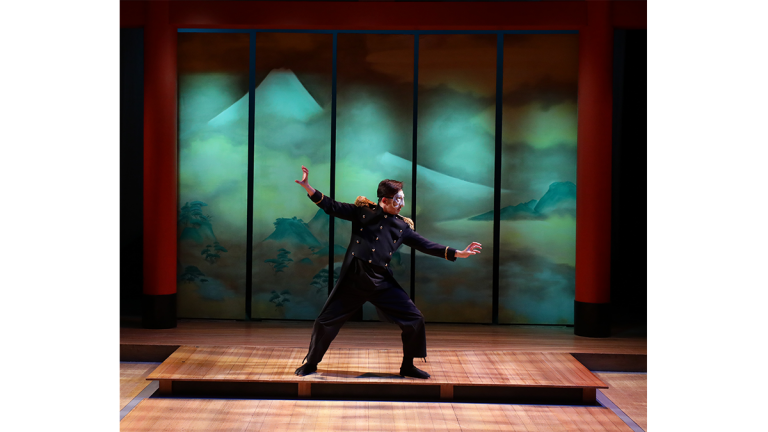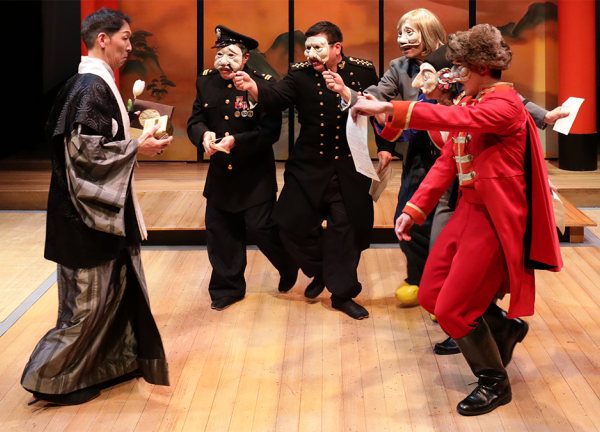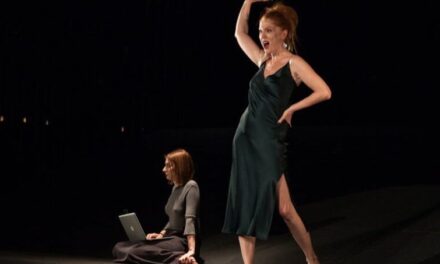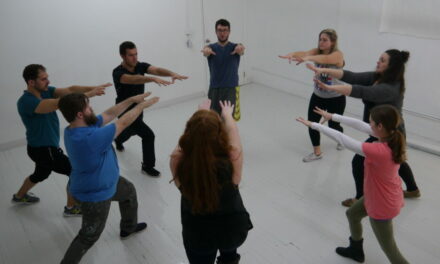Pacific Overtures, currently running through June 16th at The Lyric Stage in Boston, is one of Stephen Sondheim’s most ambitious but least produced musicals. For this show, Sondheim collaborated for the first time with librettist John Weidman–the pair would later craft Assassins and Bounce/Road Show–to present the story of Japan’s transition into a globally connected country i.e., the island nation’s forced Westernization. Pacific Overtures takes place in 19th century Japan, toward the end of the Edo period. The story follows a low ranking samurai, Kayama, and a fisherman with familiar with Western ways, Manjiro, as they negotiate and broker trade deals with the newly arrived Americans.
To emphasize Japan’s state of transition, Weidman and Sondheim blend Japanese kabuki with lyrical American witticisms. At the close of the first act, Commodore Matthew Perry performs a Lion Dance before shifting into Cakewalk.

Pacific Overtures Photo Credit: Mark S. Howard
Spiro Veloudos, a long time director of Sondheim’s works, brings this 1976 show to a 2019 audience with a skilled, if not tame, hand. Veloudos cuts the cast of over twenty down to only eleven to the intimate Lyric Stage space. He also casts women in roles originally performed by men. Most notably, Lisa Yuen plays the Reciter, the narrator role previously held by veteran actors including Mako, BD Wong, and George Takei. Sondheim’s show is contemplative and Veloudos wisely sets Pacific Overtures to a slow but always flowing pace. This leisurely tempo is reflected most clearly in the song that Sondheim names as his personal favorite: “Someone in a Tree.” In the program note, Veloudos aptly compares this number to Lin-Manuel Miranda’s “The Room Where it Happens” from Hamilton: both songs speculate what might be happening behind closed doors as diplomats discuss the future of nations. But while Miranda’s frenetic piece concentrates on the narrative and facts of its scene’s political discourse, in Sondheim’s slower interpretation, the singers ponders over the details of ambassador’s clothing, remembering what it felt like to observe these important conversations.
Lisa Yuen (the Reciter) and Carl Hsu (Kayama) both bring thoughtfulness, gravity, and maturity to their roles. But Sam Hamashima as Manjiro is the most exciting to watch and listen. His command of Sondheim’s language in “Poetry” is particularly satisfying. The three leads are backed by a strong ensemble who each perform a variety of roles. Brandon Milardo’s British Admiral–a wonderfully realized Gilbert and Sullivan caricature–is just one of many small but rich parts that help create the world of the musical through distinct character choices. The role is also one of several that effectively uses half-mask to other the strange Western newcomers.
Pacific Overtures has committed to an all Asian cast in its major productions, and in 2002 saw a successful run at the New National Theatre of Tokyo. The show also contains elements of appropriation and exoticism as to be expected of a musical written by non-Japanese-Americans in the 1970s. The Japan of Sondheim and Weidman is a tad too romantic with its noble samurai, chrysanthemum tea, sakura flowers, and feudal kowtowing. Although The Lyric concentrated on authenticity for this production, given the show’s origins Orientalism still comes to mind.
Scenes in which male actors play stereotyped females is particularly dated. It’s slightly uncomfortable to see Gary Thomas Ng’s take on the overbearing Mother and Madam characters. The song “Welcome to Kanagawa,” in which men sing in geisha drag is notably problematic. Our nation has a long racist tradition of feminizing Asian Men and it was jarring to see this number performed as written.
A large poster dominates the entrance to the Lyric Stage specifically telling the audience “Why” the Lyric is producing each show in its season; The Lyric was interested in Pacific Overtures because of the theater’s passion for Sondheim. This is an honest and revealing answer because while Pacific Overtures serves as nice musical theatre escapism, it won’t be changing Boston’s theatrical landscape. If anything, Sondheim’s show leans too heavily on outdated ideas of Eastern exoticism. However, the Lyric’s production is still a solid show and both cast and production team breathe life and joy into this rarely produced, but musically dense Sondheim work.
This post was written by the author in their personal capacity.The opinions expressed in this article are the author’s own and do not reflect the view of The Theatre Times, their staff or collaborators.
This post was written by Rem Myers.
The views expressed here belong to the author and do not necessarily reflect our views and opinions.




![Medea as a Border-Body [Part I]](https://thetheatretimes.com/wp-content/uploads/2024/06/Image-2-440x264.jpg)













